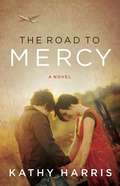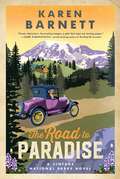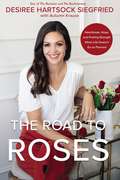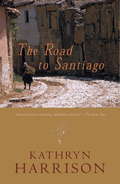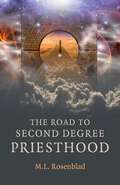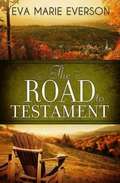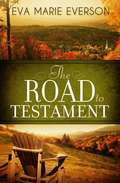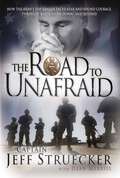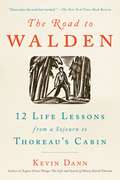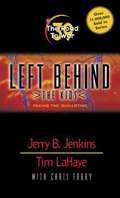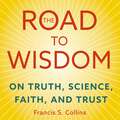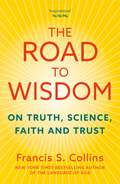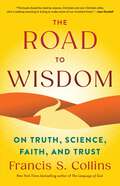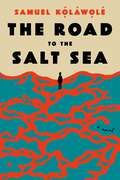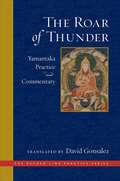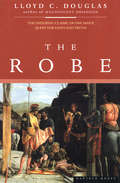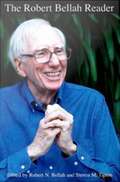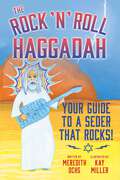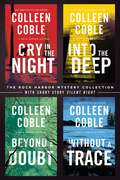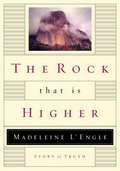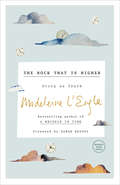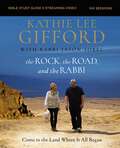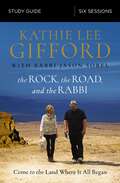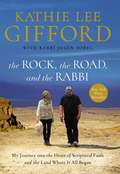- Table View
- List View
The Road to Mercy
by Kathy HarrisJosh Harrison, a contemporary Christian singer, and his wife Bethany face a difficult decision that also tests their faith. A rupture in Beth's carotid artery leaves her on the brink of death even as she's pregnant with their first child. While Dr. Ben Abrams urges her to terminate the pregnancy to save her own life, she and Josh step out on faith and decide to carry the baby to full term. During the next few months, Josh struggles with his faith, Beth hides a secret that may destroy their marriage. She also discovers a decades-old connection to Dr. Abrams that could change his life forever.
The Road to Paradise: A Vintage National Parks Novel
by Karen BarnettAn ideal sanctuary and a dream come true–that’s what Margaret Lane feels as she takes in God’s gorgeous handiwork in Mount Rainer National Park. It’s 1927 and the National Park Service is in its youth when Margie, an avid naturalist, lands a coveted position alongside the park rangers living and working in the unrivaled splendor of Mount Rainier’s long shadow. But Chief Ranger Ford Brayden is still haunted by his father’s death on the mountain, and the ranger takes his work managing the park and its crowd of visitors seriously. The job of watching over an idealistic senator’s daughter with few practical survival skills seems a waste of resources. When Margie’s former fiancé sets his mind on developing the Paradise Inn and its surroundings into a tourist playground, the plans might put more than the park’s pristine beauty in danger. What will Margie and Ford sacrifice to preserve the splendor and simplicity of the wilderness they both love? Karen Barnett’s vintage national parks novels bring to vivid life President Theodore Roosevelt’s vision for protected lands, when he wrote in Outdoor Pastimes of an American Hunter: "There can be nothing in the world more beautiful than the Yosemite, the groves of the giant sequoias and redwoods, the Canyon of the Colorado, the Canyon of the Yellowstone, the Three Tetons; and our people should see to it that they are preserved for their children and their children's children forever, with their majestic beauty all unmarred."
The Road to Quiet
by Ree HowellIn this uplifting story which takes place in the Napa Valley wine country, a rich man's son, Peter Ennis, drives drunk, and a young girl named Lily is killed. Peter walks away from the accident without being charged with her death. As a result, he determines to make restitution to the four people most affected by this tragedy. But redemption comes with a price, and Peter, whose heart has never included the world around him, is dramatically changed by these four people as they respond both to Lily's death and to him.
The Road to Roses: Heartbreak, Hope, and Finding Strength When Life Doesn't Go as Planned
by Desiree Hartsock SiegfriedWhen Desiree Hartsock was offered the opportunity to star on The Bachelorette, she thought she was finally getting the life she always longed for. Yet her reality TV dreams gave way to rough roads of unexpected twists, public scrutiny, and rejection. Now for the first time, Desiree reveals in this rivetingly honest book how she found her resilience and love after all--and you can too. Desiree Hartsock was living paycheck to paycheck and freshly--not to mention painfully--single when she first stepped onto the set of The Bachelor. Then when she was selected to star as The Bachelorette, she thought surely this turn of events promised a second chance. Yet Desiree's debut on the world stage also meant facing the critics, as viewers judged her every word and action. She was devastated when Brooks broke up with her and the entire world observed her humiliation. But what the world didn't see was the comeback journey that followed. The Road to Roses reveals: The emotional journey behind the events that played out on cameraThe mindset changes that kept Desiree open to love and trust even after heartbreak, that ultimately led her to choosing her husbandAnd the off-camera journey of the lessons Desiree learned, like how to always fail forward, stay true to yourself, and trusting that despite the external pressures, God loves us just as we areFor anyone who is looking at the pieces of their lives and losing hope that they can be put back together again, The Road to Roses offers an authentic guide for finding your grit to keep going and make yourself proud no matter what pressures you face. Whether your heart has been broken, your dream has been put on hold, or your character is being put under pressure, following Desiree's journey will give you courage to stay strong in your own.
The Road to Santiago
by Kathryn HarrisonOvercome by the scenic beauty, Harrison threw open the hotel-room window shutters and exclaimed, "Look at the mountains!" From behind her, 12-year-old Sarah ecstatically waved the television's remote control and shouted, "French MTV!" So began a voyage distinguished by a mother getting to know herself through her daughter. For hundreds of years, thousands of worshipers have trekked, like this mother and daughter, on foot, the 400 miles from St.-Jean-Pied-de-Port, France, to the sacred shrine of the apostle James, the brother of Jesus. Everyone who endures the inhospitable weather, poor road conditions, and exhaustion does so not so much to enjoy the shrine as to survive the pilgrimage, a time-out-of-time penance. Harrison had taken the journey before, alone, and learned something about herself. Her account of her accompanied, reprise journey and what she learned, part of the National Geographic Directions travel series, endears with its wit and sensitivity.
The Road to Second Degree Priesthood
by M. L. RosenbladThe second book in a series of three, leading to the knowledge needed for becoming active clergy on the earth-based path. Delving into the many facets of the path, it also covers interfaith cooperation, religious philosophy and comparison as well as earth stewardship.
The Road to Testament
by Eva Marie EversonAshlynne Rothschild grew up with the proverbial silver spoon in her mouth. Smart and sassy, Ashlynne expects to inherit the Parks & Avenues magazine empire. But her family has other ideas. Feeling she needs to understand the world beyond, they ship her off to Testament, North Carolina, for a little "learning about life." William Decker grew up in a small town with dreams of big-city success. But when the spoiled Ashlynne falls under his authority, her big city ways aren't so appealing. Ashlynne's attempt at "learn normal" ends with a wounded spirit, while William's "reach for the stars" attitude ends with a wounded heart. When these two journalists go head to head, the race is on to see if either will succeed in getting what they really want.
The Road to Testament
by Eva Marie EversonAshlynne Rothschild grew up with the proverbial silver spoon in her mouth. Smart and sassy, Ashlynne expects to inherit the Parks & Avenues magazine empire. But her family has other ideas. Feeling she needs to understand the world beyond, they ship her off to Testament, North Carolina, for a little "learning about life." William Decker grew up in a small town with dreams of big-city success. But when the spoiled Ashlynne falls under his authority, her big city ways aren't so appealing. Ashlynne's attempt at "learn normal" ends with a wounded spirit, while William's "reach for the stars" attitude ends with a wounded heart. When these two journalists go head to head, the race is on to see if either will succeed in getting what they really want.
The Road to Unafraid: How the Army's Top Ranger Faced Fear and Found Courage through
by Jeff StrueckerJeff Struecker, a "Black Hawk Down" hero, the Army's Top Ranger, now an Army Chaplain, relates his own tales from the frontlines of every U.S. initiative since Panama, and tells how God taught him faith from the front in fear-soaked times. As readers go on-mission with Struecker through his harrowing tales, they will learn how to face their own fears with faith in a mighty God. Just as he told one of his charges in Mogadishu: "The difference between being a coward and a hero is not whether you're scared, it's what you do while you're scared."
The Road to Walden: 12 Life Lessons from a Sojourn to Thoreau's Cabin
by Kevin DannThe acclaimed author of Expect Great Things: The Life and Search of Henry David Thoreau traverses on foot from Manhattan to Walden Pond, retracing Thoreau's steps and unlocking the practical principles of the mystic's life in the woods.When Henry David Thoreau launched his experiment in living at Walden Pond, he began by walking beyond the narrow limits of his neighbors, simply by putting himself at a mile remove from Concord's bourgeois epicenter - and a thousand-mile remove from stasis, complacency, and conformity. Kevin Dann emulates and extends Thoreau's experiment in radical self-education. Alternating between personal anecdotes from his spring 2017 walking pilgrimage and other "traveler" encounters and episodes told by Thoreau, Dann structures his book around 12 "injunctions"--distillations of seminal stories about overcoming convention and stasis. In this essential reading for every Thoreau enthusiast, naturalist and historian Kevin Dann brings to life an essential American icon in refreshing and modern way.
The Road to War: Facing the Guillotine (Left Behind #39)
by Tim Lahaye Jerry B. Jenkins Chris FabryJoin the young Trib Force as they grow closer and closer to the return of Christ.
The Road to Wisdom: On Truth, Science, Faith and Trust
by Francis S. CollinsFrom world-leading scientist and New York Times bestselling author of The Language of God, a deeply thoughtful guidebook to discerning what and who we can trust to move us from societal discord to civic harmony.As the COVID-19 pandemic revealed, western society has become not just hyper-partisan, but also deeply cynical; distrustful of traditional sources of knowledge and wisdom such as science and faith. Scepticism about vaccines led to the needless deaths of at least 230,000 Americans, and "Do your own research" is now a rallying cry in many online rabbit holes. Yes, experts can make mistakes, and institutions can lose their moral compass, but there are reliable ways and means to weigh information and navigate truth, and The Road to Wisdom is here to help us rediscover them.Francis Collins reminds us of the four core sources of judgement and clear thinking: truth, science, faith, and trust. Drawing on his scientific work at the forefront of the Human Genome Project and the US National Institutes of Health, as well as on ethics, philosophy, and theology, Collins makes a robust, thoughtful case for each of these sources - their reliability, and their limits. Ultimately, he shows how they work together, not separately - and certainly not in conflict. It is only when we re-link these four pillars of wisdom that we can begin to discern the best path forward in life.Hopeful, accessible, winsome, and deeply wise, The Road to Wisdom leads us beyond current animosities to surer footing. Here is the moral, philosophical, and scientific framework with which to address the problems of our time - on the world stage, but also in our daily lives.
The Road to Wisdom: On Truth, Science, Faith and Trust
by Francis S. CollinsFrom world-leading scientist and New York Times bestselling author of The Language of God, a deeply thoughtful guidebook to discerning what and who we can trust to move us from societal discord to civic harmony.As the COVID-19 pandemic revealed, western society has become not just hyper-partisan, but also deeply cynical; distrustful of traditional sources of knowledge and wisdom such as science and faith. Scepticism about vaccines led to the needless deaths of at least 230,000 Americans, and "Do your own research" is now a rallying cry in many online rabbit holes. Yes, experts can make mistakes, and institutions can lose their moral compass, but there are reliable ways and means to weigh information and navigate truth, and The Road to Wisdom is here to help us rediscover them.Francis Collins reminds us of the four core sources of judgement and clear thinking: truth, science, faith, and trust. Drawing on his scientific work at the forefront of the Human Genome Project and the US National Institutes of Health, as well as on ethics, philosophy, and theology, Collins makes a robust, thoughtful case for each of these sources - their reliability, and their limits. Ultimately, he shows how they work together, not separately - and certainly not in conflict. It is only when we re-link these four pillars of wisdom that we can begin to discern the best path forward in life.Hopeful, accessible, winsome, and deeply wise, The Road to Wisdom leads us beyond current animosities to surer footing. Here is the moral, philosophical, and scientific framework with which to address the problems of our time - on the world stage, but also in our daily lives.
The Road to Wisdom: On Truth, Science, Faith, and Trust
by Francis S. CollinsFrom &“national treasure&” Francis Collins (Philip Yancey), the New York Times bestselling author of The Language of God and former director of the National Institutes of Health, comes a deeply thoughtful guidebook to get us beyond societal divisions and back to the sources of wisdom—"the sort that can save us before it is too late&” (Jane Goodall). As the COVID-19 pandemic revealed, we have become not just a hyper-partisan society but also a deeply cynical one, distrustful of traditional sources of knowledge and wisdom. Skepticism about vaccines led to the needless deaths of at least 230,000 Americans. &“Do your own research&” is now a rallying cry in many online rabbit holes. Yet experts can make mistakes, and institutions can lose their moral compass. So how can we navigate through all this? In The Road to Wisdom, Francis Collins reminds us of the four core sources of judgement and clear thinking: truth, science, faith, and trust. Drawing on his work from the Human Genome Project and heading the National Institutes of Health, as well as on ethics, philosophy, and Christian theology, Collins makes a robust, thoughtful case for each of these sources—their reliability, and their limits. Ultimately, he shows how they work together, not separately—and certainly not in conflict. It is only when we relink these four foundations of wisdom that we can begin to discern the best path forward in life. Thoughtful, accessible, winsome, and deeply wise, The Road to Wisdom leads us beyond current animosities to surer footing. Here is the moral, philosophical, and scientific framework with which to address the problems of our time—including distrust of public health, partisanship, racism, response to climate change, and threats to our democracy—but also to guide us in our daily lives. This is a book that will repay many readings, and resolve dilemmas that we all face every day.
The Road to the Salt Sea: A Novel
by Samuel KolawoleAs wrenching and luminous as Omar El Akkad’s What Strange Paradise and Mohsin Hamid’s Exit West, a searing exploration of the global migration crisis that moves from Nigeria to Libya to Italy, from an exciting new literary voice.Able God works for low pay at a four-star hotel where he must flash his “toothpaste-white smile” for wealthy guests. When not tending to the hotel’s overprivileged clientele, he muses over self-help books and draws life lessons from the game of chess.But Able’s ordinary life is upended when an early morning room service order leads him to interfere with Akudo, a sex worker involved with a powerful but dangerous hotel guest. Suddenly caught in a web of violence, guilt, and fear, Able must run to save himself—a journey that leads him into the desert with a group of drug-addled migrants, headed by a charismatic religious leader calling himself Ben Ten. The travelers’ dream of reaching Europe—and a new life—is shattered when they fall prey to human traffickers, suffer starvation, and find themselves on the precipice of death, fighting for their lives and their freedom.As Able God moves into the treacherous unknown, his consciousness becomes focused on survival and the foundations of his beliefs—his ideas about betterment and salvation—are forever altered. Suspenseful, incisive, and illuminating, The Road to the Salt Sea is a story of family, fate, religion, survival, the failures of the Nigerian class system, and what often happens to those who seek their fortunes elsewhere.
The Roar of Thunder: Yamantaka Practice and Commentary (The Dechen Ling Practice Series)
by Ngulchu Dharmabhadra and the Fifth Ling Rinpoche, Losang Lungtog Tenzin TrinleyAn essential collection of tantric texts on a meditation practice essential to one of the largest traditions of Buddhism in Tibet.Yamantaka is the wrathful expression of the wisdom buddha Manjushri and was Tsongkhapa&’s foremost personal deity, from whom he received direct visions that were a constant source of empowerment, inspiration, instruction, and even personal advice. The oral instructions on the practice of Yamantaka fall into two main streams. The quintessential instruction of both of these lineages, including both their generation- and completion-stage teachings, are contained in the two commentaries presented in this volume. First, we have commentary from the great scholar, siddha, and lineage holder of the Gelug Mahamudra lineage, Ngulchu Dharmabhadra, on the Thirteen Deity practice. These texts contain a wellspring of oral instructions that provide rich and highly accessible details concerning the practice of Yamantaka that are equally applicable to the Solitary Hero practice, the practice of the second stream. The second commentary, composed by the Fifth Ling Rinpoche, Losang Lungtog Tenzin Trinley, is concerned with the Solitary Hero practice and contains many extraordinary instructions that have not been written down in other texts but have been preserved through the oral lineage. This text is part of a highly secretive volume containing many texts on Solitary Hero Yamantaka entitled the Eighteen Steps of Solitary Hero. The combination of these two texts gives the reader an unprecedented panoramic perspective on the entire spectrum of Yamantaka practice. Also included in this amazing volume is the extensive sadhana of the Solitary Hero composed by Pabongkha Rinpoche that can be used as a reference to facilitate a more thorough understanding of the commentaries.
The Robe: The Story Of The Soldier Who Tossed For Christ's Robe And Won
by Lloyd C. DouglasMore than 6 million copies sold! The classic Christian novel of the crucifixion and one Roman soldier&’s transformation through faith. At the height of his popularity, Lloyd C. Douglas was receiving an average of one hundred letters a week from fans. One of those fans, a department store clerk in Ohio named Hazel McCann, wrote to Douglas asking what he thought had happened to Christ&’s garments after the crucifixion. Douglas immediately began working on The Robe, sending each chapter to Hazel as he finished it. It is to her that Douglas dedicated this book. A Roman soldier wins Christ&’s robe as a gambling prize. He then sets forth on a quest to find the truth about the Nazarene—a quest that reaches to the very roots and heart of Christianity. Here is the fascinating story of this young Roman soldier, Marcellus, who was in charge at the crucifixion of Jesus. After he won Christ&’s robe in a game of dice on Calvary, he experienced a slow and overpowering change in his life. Through the pages of this great book, the reader sees how a pagan Roman was eventually converted to Christ. Set against the vividly drawn background of ancient Rome, this is a timeless story of adventure, faith, and romance, a tale of spiritual longing and ultimate redemption . . .
The Robert Bellah Reader
by Robert N. Bellah Steven M. TiptonPerhaps best known for his coauthored bestselling books Habits of the Heart and The Good Society, Robert N. Bellah is a truly visionary leader in the social study of religion. For more than four decades, he has examined the role of religion in modern and premodern societies, attempting to discern how religious meaning is formed and how it shapes ethical and political practices. The Robert Bellah Reader brings together twenty-eight of Bellah's seminal essays. While the essays span a period of more than forty years, nearly half of them were written in the past decade, many in the past few years. The Reader is organized around four central concerns. It seeks to place modernity in theoretical and historical perspective, drawing from major figures in social science, historical and contemporary, from Aristotle and Rousseau through Durkheim and Weber to Habermas and Mary Douglas. It takes the United States to be in some respects the type-case of modernity and in others the most atypical of modern societies, analyzing its common faith in individual freedom and democratic self-government, and its persistent paradoxes of inequality, exclusion, and empire. The Reader is also concerned to test the axiomatic modern assumption that rational cognition and moral evaluation, fact and value, are absolutely divided, arguing instead that they overlap and interact much more than conventional wisdom in the university today usually admits. Finally, it criticizes modernity's affirmation that faith and knowledge stand even more utterly at odds, arguing instead that their overlap and interaction, obvious in every premodern society, animate the modern world as well. Through such critical and constructive inquiry this Reader probes many of our deepest social and cultural quandaries, quandaries that put modernity itself, with all its immense achievements, at mortal risk. Through the practical self-understanding such inquiry spurs, Bellah shows how we may share responsibility for the world we have made and seek to heal it.
The Rock 'N' Roll Haggadah: Your Guide to a Seder That Rocks!
by Meredith Ochs Kay MillerA rock-and-roll infused Haggadah that brings the intertwined history of Judaism and music to your Seder table.Passover is one of the most celebrated Jewish holidays. Families all over the world gather around the dining table to recite the story of the Exodus from Egypt, honor the freedom of the Jewish people, and look toward the future. The Rock &‘N&’ Roll Haggadah shares the traditional biblical stories and rituals of a standard Haggadah, but it also includes a rich tapestry of anecdotes that speak to the influence of Judaism on artists and their music, and its culinary, historical, and anthropological impact. Throughout the book, which features English, Hebrew, and transliterations, you&’ll find vibrant illustrations and little-known rock and roll references that lightheartedly tie into the narratives of the &“Ten Plagues,&” &“Forty Years in the Desert,&” &“Elijah&’s Cup,&” and more. It also includes fun DIY projects such as making a rock-and-roll Egyptian centerpiece and a record album Seder plate, as well as suggestions for a Passover playlist that will enhance any Seder. Whether you&’re hosting or attending a Seder, the book&’s wide range of musicians and songs will spark conversations among all generations at the table and provide a fantastic soundtrack for any Passover celebration.
The Rock Harbor Mysteries Collection: Without a Trace, Beyond a Doubt, Into the Deep, Cry in the Night, and Silent Night (Rock Harbor Series)
by Colleen CobleUSA Today best-selling author Colleen CobleÆs Rock Harbor series now available in one volume! Without a Trace Bree thinks a plane crash took the lives of her husband and young son, but her son Davy survived the accident. Can she find him before itÆs too late? Beyond a Doubt Evidence of a violent crime in BreeÆs basement causes police to re-open a cold case. Can she and her K-9 search dog, Samson, stop the killer before he strikes again? Into the Deep When BreeÆs dog Samson goes missing, itÆs just the beginning of her life turning upside down. Cry in the Night Bree and Samson discover a crying infant in the snowy Rock Harbor forest. But where are the babyÆs parents? And how did she get there? Silent Night As Christmas day nears, Bree and her faithful search-and-rescue dog Samson follow the trail of a troubling mystery into the snowy forests of Rock Harbor.
The Rock That Is Higher: Story As Truth
by Madeleine L'Engle"We are all strangers in a strange land, longing for home, but not quite knowing what or where home is. We glimpse it sometimes in our dreams, or as we turn a corner, and suddenly there is a strange, sweet familiarity that vanishes almost as soon as it comes Madeleine L Engle, from "The Rock That Is Higher Story captures our hearts and feeds our imaginations. It reminds us who we are and where we came from. Story gives meaning and direction to our lives as we learn to see it as an affirmation of God s love and truth an acknowledgment of our longing for a rock in the midst of life s wilderness. Drawing upon her own experiences, well-known tales in literature, and selected narratives from Scripture, Madeleine L Engle gently leads the way into the glorious world of story in "The Rock That Is Higher. " Here she acknowledges universal human longings and considers how literature, Scripture, personal stories, and life experiences all point us toward our true home. "
The Rock That Is Higher: Story as Truth
by Madeleine L'Engle Sarah BesseyWe are all strangers in a strange land, longing for home, but not quite knowing what or where home is. We glimpse it sometimes in our dreams, or as we turn a corner, and suddenly there is a strange, sweet familiarity that vanishes almost as soon as it comes… –Madeleine L’Engle, from The Rock That Is HigherStory captures our hearts and feeds our imaginations. It reminds us who we are and where we came from. Story gives meaning and direction to our lives as we learn to see it as an affirmation of God’s love and truth–an acknowledgment of our longing for a rock in the midst of life’s wilderness.Drawing upon her own experiences, well-known tales in literature, and selected narratives from Scripture, Madeleine L’Engle gently leads the way into the glorious world of story in The Rock That Is Higher. Here she acknowledges universal human longings and considers how literature, Scripture, personal stories, and life experiences all point us toward our true home.
The Rock, the Road, and the Rabbi Bible Study Guide plus Streaming Video, Updated Edition: Come to the Land Where It All Began
by Kathie Lee GiffordThis Bible Study Guide includes an access code to stream all six video teaching sessions.Begin your journey to a deeper faith by traveling to the land where the Bible was written.Kathie Lee Gifford and Rabbi Jason Sobel will take you and your group beyond the typical "Sunday school" teaching to examine the true texts of the Bible.In this six-session video Bible study (video streaming code included), Kathie Lee invites you to join her as she visits sites in Israel that have impacted her faith and understanding of Scripture. As she shares her story, coauthor Rabbi Jason—a messianic Jewish rabbi—provides fascinating background details that make the story of the New Testament come alive.As Kathie Lee and Rabbi Jason reveal in this study, Jesus (the Rock) came into this world and walked the lands of Israel (the Road) to show us the way to God. And when we are introduced to the mysteries of God&’s Word (the Rabbi) and understand it in the context in which it was written, radical transformation begins to renew our hearts and minds.Sessions and video run times:Bethlehem: Where It All Began (13:30)Nazareth: The Early Years (13:30)Capernaum: Ministry Headquarters (14:00)Galilee: Ministry Grounds (16:30)Mount of Olives: The Triumphal Entry (13:30)Jerusalem: Crucifixion and Resurrection (14:30) This study guide has everything you need for a full Bible study experience, including:The study guide itself—with discussion and reflection questions, video notes, and a leader's guide.An individual access code to stream all video sessions online. (You don&’t need to buy a DVD!)Streaming video access code included. Access code subject to expiration after 12/31/2028. Code may be redeemed only by the recipient of this package. Code may not be transferred or sold separately from this package. Internet connection required. Void where prohibited, taxed, or restricted by law. Additional offer details inside.
The Rock, the Road, and the Rabbi Bible Study Guide: Come to the Land Where It All Began
by Kathie Lee GiffordKathie Lee Gifford always believed the Bible held the answers to every question a person could ask. Her problem was: how could she be sure of what the Bible was really saying when we are so separated from the ancient Jewish culture in which it was written? As a lifelong student of Scripture, Kathie Lee Gifford has always desired a deeper understanding of God&’s Word and a deeper knowledge of God Himself. But it wasn&’t until she began studying the biblical texts in their original Hebrew and Greek—along with actually hiking the ancient paths of Israel—that she found the fulfillment of those desires. In this six-session video study (DVD/video streaming sold separately), Kathie Lee invites you to join her as she visits sites in Israel that have impacted her life. As she shares her story, Rabbi Jason Sobel, a messianic Jewish rabbi who was trained in the ancient rabbinical way, provides fascinating background details into the language, culture and heritage that make the story of the New Testament come alive. Kathie Lee and Rabbi Sobel will take you and your group beyond the typical "Sunday school" teaching to examine the original texts of the Bible. Now you can walk with Kathie on a journey through the spiritual foundations of her faith: The Rock (Jesus Christ): Hear directly from Kathie about her life-changing and ever-deepening connection with Jesus, the Lover of her soul. The Road (Israel): Explore dozens of ancient landmarks and historical sites from Israel, the promised land of God&’s covenant. The Rabbi (God&’s Word): Go beyond a Sunday-school approach to the Bible by digging into the original languages and deeper meanings of the Holy Scriptures. Come! Explore the land of Israel and mine the treasures of God's Word. There is so much more! Sessions include: Bethlehem: Where It All Began Nazareth: The Early Years Capernaum: Ministry Headquarters Galilee: Ministry Grounds Mount of Olives: The Triumphal Entry Jerusalem: Crucifixion and Resurrection Designed for use with The Rock, the Road, and the Rabbi Video Study (9780310095033), sold separately.
The Rock, the Road, and the Rabbi: My Journey into the Heart of Scriptural Faith and the Land Where It All Began
by Kathie Lee Gifford Rabbi Jason SobelAs a lifelong student of Scripture, Kathie Lee Gifford has always desired a deeper understanding of God’s Word and a deeper knowledge of God Himself. But it wasn’t until she began studying the biblical texts in their original Hebrew and Greek—along with actually hiking the ancient paths of Israel—that she found the fulfillment of those desires.Now you can walk with Kathie on a journey through the spiritual foundations of her faith:The Rock (Jesus Christ): Hear directly from Kathie about her life-changing and ever-deepening connection with Jesus, the Lover of her soul.The Road (Israel): Explore dozens of ancient landmarks and historical sites from Israel, the promised land of God’s covenant.The Rabbi (God’s Word): Go beyond a “Sunday school” approach to the Bible by digging into the original languages and deeper meanings of the Holy Scriptures.As you journey through The Rock, The Road, and The Rabbi, you’ll also find additional content from Messianic Rabbi Jason Sobel throughout the book. Jason’s insight into the Hebrew language, culture, and heritage will open your eyes to the Bible like never before.Come! Begin your journey toward a deeper faith through The Rock, the Road, and the Rabbi.
